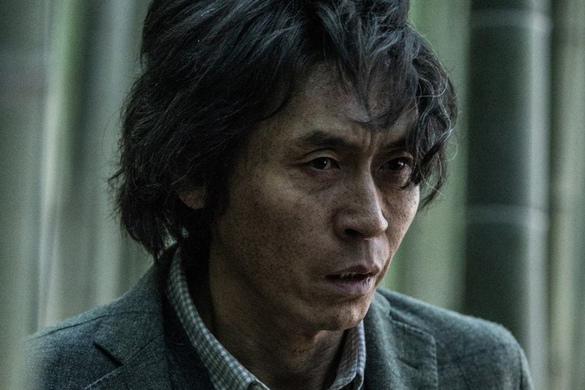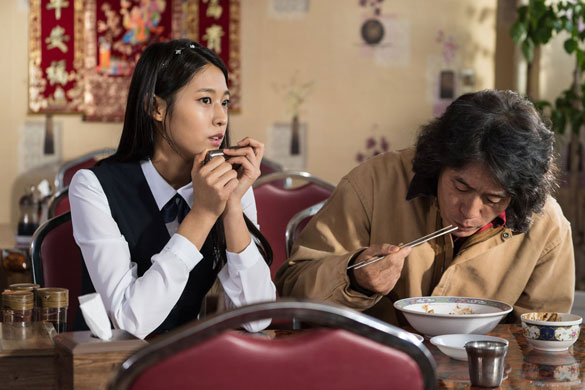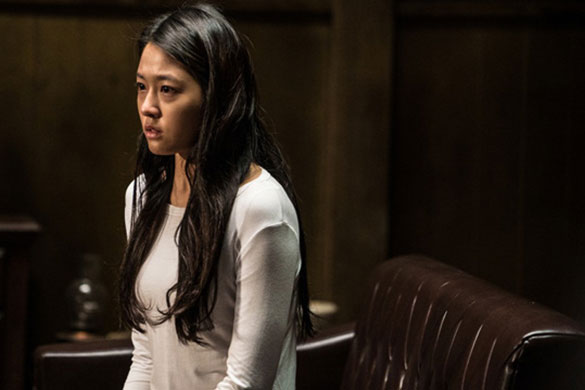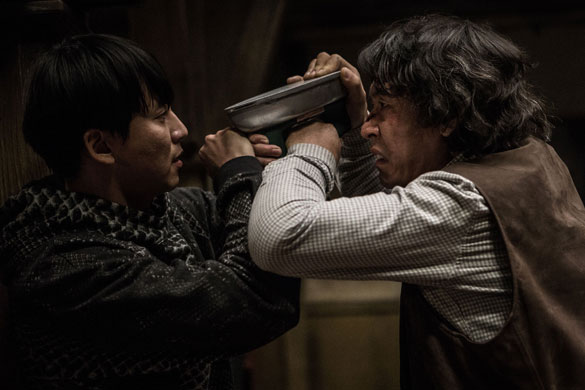
 |
||||
Byung-soo (Sol Kyung-gu) is an aging man suffering from ever-worsening symptoms of dementia. Though his daughter Eun-hee (Kim Seol-hyun) and his policeman friend Byung-man (Oh Dal-su) do everything they can to try to help him cope with his debilitating condition on a daily basis, Byung-soo’s lucid periods are nonetheless gradually dwindling and being increasingly peppered with memory loss, confusion and even paranoid delusions.
However, illness aside, Byung-soo has a dark past that he has kept hidden from all around him. That is, that for many years he was a serial killer – a fact he has only revealed in his own secret journal.
Review: Memoir of a Murderer is based on the 2013 novel A Murderer’s Guide to Memorization by Kim Young-ha, an author fans of Korean cinema will likely recognise from his short stories A Meditation On Mirror and Photo Shop Murder that were turned into Byun Hyuk’s 2004 film The Scarlet Letter, and from his work on the adapted screenplay for John H. Lee’s film A Moment to Remember (also from 2004). With both of those earlier films now considered classic and indeed seminal examples of New Korean Cinema wave output, it comes as little surprise that another Kim Young-ha work was chosen for this latest cinematic treatment. A Moment to Remember and Memoir of a Murderer, of course, both deal with characters suffering from forms of dementia, and while their depictions and focus in terms of the neurological conditions ultimately differ greatly – each dictated by the relevant genre (romantic melodrama and thriller, respectively) – at their core they are rooted in the same place, that is the idea of the loss of one’s memory leading to the loss of oneself and indeed one’s self.
In the early stages of the main narrative as we're properly introduced to Byung-soo, see his growing dementia first hand and indeed see both the effect it has on those around him and their efforts to help him, Byung-soo appears on the surface to be a completely closed individual seemingly in denial of his condition and standing against others doing what they can to make things easier for him, but several tiny and deftly accented codas to scenes show that he is not only fully aware of his condition but also fearful of it (the aforementioned knowledge of his loss of memories and the subsequent, inevitable loss of himself) and is in no doubt of his increasing need for the help of others even if he outwardly denies it - Byung-soo’s daughter, Eun-hee, giving him a dictaphone to help him remember which he initially turns his nose up at, but which he quietly grabs and takes into his possession when she says “Ok, if you don't want it I'll take it away.”; or Eun-hee bringing him two large dumplings which he instantly says he doesn't like, until she leaves the room at which point he wolfs one down; etc. As already stated, or at least hinted at, the neurological effects of Byung-soo’s dementia over time morph into hallucinatory events that result in neither he nor viewers being sure of what's real, what's paranoid delusion, what serial killer Tae-ju has really done and what he hasn't until scenes are shown for a second time from a different perspective (Byung-soo, for example, seeing attempted strangulation marks on Eun-hee’s neck and immediately vehemently stating that he'll make Tae-ju pay, only to be told by his daughter that he himself caused them after having one of his facial spasms). While a neurologist might perhaps take issue with some of these, let's not forget that they are at the end of the day part of an overall plot device to add to the unpredictable nature of the narrative and ramp up the thrills and as such I personally was pretty much able to accept them for the sake of what is ultimately a fairly gripping, sometimes even thrilling story without too much problem at all, even if there are so many such scenes that in hindsight I almost wondered if they'd all been included simply because Won Shin-yeon knew he could petty much get away with it as much as needing them for the narrative’s progression. A certain amount of tightening up might not, perhaps, have gone amiss in the climactic mano-a-mano battle between Byung-soo and Tae-ju, but that as far as I'm concerned is as much due to the fact that (as is again the case in a veritable myriad of Korean films from recent years) the narrative appears to reach its climax and culmination when there are still 20 minutes of coda scenes still to unfold; scenes that are to my mind more important than the specific length of the men's fight. That ultimately isn't particularly a criticism on my part, just more of a personal feeling.
However, there was one narrative implication present that I did have somewhat of an issue with: Both Byung-soo and Tae-ju’s violent proclivities are said to be the result of head trauma - Byung-soo in a car accident, Tae-ju during childhood abuse. While in real life that certainly could be the case, I can't step away from the film's (almost) implication that such brain injuries explain away their violence adequately. After all, there are plenty of individuals who have suffered such physical abuse and trauma but have never had the proclivity for violence against the innocent or indeed murder. This to my mind is the cinematic equivalent of a real life killer entering a plea of diminished responsibility, his lawyer citing his difficult upbringing as causal to his/her actions, and that as far as I'm concerned is far too much of a get out clause to be taken seriously as anything other than an over-simplified generalisation. Speaking of, there is one small scene – not much more than five seconds in duration – that should either never have been included at all or at the very least should have been unceremoniously dumped at the film's editing stage. Fear of spoilers prevents me from being more specific than saying that the offending moment relates to a previous head injury suffered by Tae-ju but, trust me, you'll know it as soon as it appears and I'll almost wager that you'll find it as laughably ludicrous a moment as I did. As a final point, huge credit should be given to Kim Young-ha, Won Shin-yeon and indeed Sol Kyung-gu for successfully eliciting empathy and sympathy for Byung-soo, his plight and even nudging us to root for him in his battle with Tae-ju. He is a serial killer too, after all. The fact that from the very outset of the film we are right there alongside him as his disease progresses is, of course, the beginning of this; gentle, genuinely amusing moments naturally and understatedly encourage us to warm to the character in spite of the things we know he's done in the past; and the fact that his aim in attempting to kill Tae-ju is ultimately to protect innocent Eun-hee is yet a further prod in that direction. Murder cannot ever be condoned in any respect in spite of the fact that Byung-soo only killed those he deemed as 'deserving' - violent abusers and the like (a moral compass of sorts, albeit a twisted and deeply misguided one) - but if we compare him to Tae-ju - a man who frankly kills for pleasure alone, the more innocent and vulnerable his victims the better from his warped perspective - it could be said that Tae-ju is even more of a monster in the grand scheme of things. Two murderers at loggerheads could never be called good versus evil but at times Memoir of a Murderer almost makes it feel like it is, to as much a degree as is possible, and that really says something for the accomplishments of the narrative, as far as I'm concerned.
MEMOIR OF A MURDERER (살인자의기억법) / 2017 / Directed by Won Shin-yeon
|
||||
All images © Showbox Review © Paul Quinn |
||||



